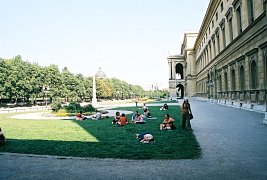
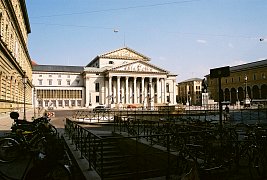 On the east of the Feldherrnhal is the Hofgarten, a Renaissance court
garden dating
from Duke Maximilian I's time (1613-1617). It is laid out after
an Italian formal
garden and features a central temple crowned by a doomed roof with
a copy of a bronze figure symbolizing Bavaria.
Somehow we walked through a doorway leading out of
the Hofgarten and were confronted
with the Bavarian State Opera building.
On the east of the Feldherrnhal is the Hofgarten, a Renaissance court
garden dating
from Duke Maximilian I's time (1613-1617). It is laid out after
an Italian formal
garden and features a central temple crowned by a doomed roof with
a copy of a bronze figure symbolizing Bavaria.
Somehow we walked through a doorway leading out of
the Hofgarten and were confronted
with the Bavarian State Opera building.
|
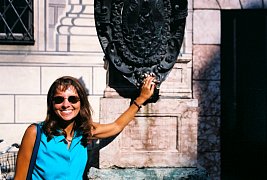 As we walked along the Hofgarten we noticed people stopping and
touching the noses of two brass lions. Here is Margaret doing the
same. Is it supposed to bring good luck?
As we walked along the Hofgarten we noticed people stopping and
touching the noses of two brass lions. Here is Margaret doing the
same. Is it supposed to bring good luck?
|

|
|
Look at the map above. We are at the Theatinerkirche and are
going to take a long walk along the Maximillianstrasse,the ritzy
shopping street
and then on to near Maximillian bridge. Then we are going
to double back to that famous tourist spot, the Hofbraunhaus.
|
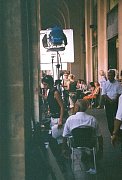 We walked by this spot on Maximillianstrasse where they seemed
to be taping a movie or commercial. I got several dirty looks from
the folks here as I took this picture.
We walked by this spot on Maximillianstrasse where they seemed
to be taping a movie or commercial. I got several dirty looks from
the folks here as I took this picture.
|
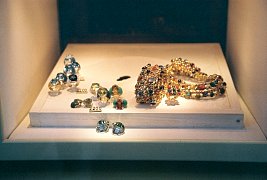 Here is a window full of fabulous jewelry (bling bling?) that you
can purchase if you have the asking price in Euros.
Here is a window full of fabulous jewelry (bling bling?) that you
can purchase if you have the asking price in Euros.
|
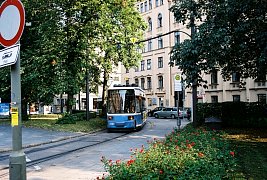
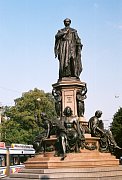 We are near the traffic circle where I showed on the map we turned around.
The streetcars are very modern. This is a statue of Maximillian II.
We are near the traffic circle where I showed on the map we turned around.
The streetcars are very modern. This is a statue of Maximillian II.
|
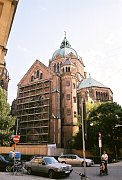 Now we are on some of the back streets away from Maximillianstrasse. I don't
remember the name of this church, I just remember it's not Catholic.
Now we are on some of the back streets away from Maximillianstrasse. I don't
remember the name of this church, I just remember it's not Catholic.
|
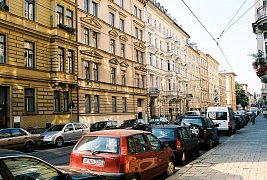
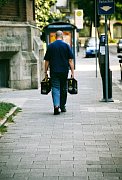 This must be a residential section. For some reason I just had
to snap a picture of this guy carrying his beer bottles
down the street,
This must be a residential section. For some reason I just had
to snap a picture of this guy carrying his beer bottles
down the street,
|
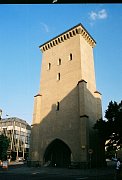 After some wandering we again reached the vicinity of the Marienplatz.
Looking down the street very near the Marienplatz we spied the tower
from Isartor (Isar Gate).
Munich was originally surrounded by a wall,
which had four gates built into it. Isartor is the
eastern-most of Munich's three remaining town
gates and dates from the 14th century.
It was erected under Ludwig the Bavarian in 1337
and comprises a tall main tower, two front towers and a bailey.
Most views of Isar Gate
on the Internet show the view from the outside the original town, which includes more wall and
not just this tower.
The Isartor was severely damaged during World War II, and in 1958 the ruin was donated to
the Karl-Valentin Foundation.
Careful restoration has recreated the dimensions and
appearance of the original structure.
The Valentinisartorausstellungsturmausschuß (Valentin and Isar Gate Exhibition Tower Committee)
created a memorial for the comedian and Munich folk singer Karl Valentin. The Valentin Museum
inside the Isartor, exhibiting various curiosities, was first opened in September 1958.
After some wandering we again reached the vicinity of the Marienplatz.
Looking down the street very near the Marienplatz we spied the tower
from Isartor (Isar Gate).
Munich was originally surrounded by a wall,
which had four gates built into it. Isartor is the
eastern-most of Munich's three remaining town
gates and dates from the 14th century.
It was erected under Ludwig the Bavarian in 1337
and comprises a tall main tower, two front towers and a bailey.
Most views of Isar Gate
on the Internet show the view from the outside the original town, which includes more wall and
not just this tower.
The Isartor was severely damaged during World War II, and in 1958 the ruin was donated to
the Karl-Valentin Foundation.
Careful restoration has recreated the dimensions and
appearance of the original structure.
The Valentinisartorausstellungsturmausschuß (Valentin and Isar Gate Exhibition Tower Committee)
created a memorial for the comedian and Munich folk singer Karl Valentin. The Valentin Museum
inside the Isartor, exhibiting various curiosities, was first opened in September 1958.
|
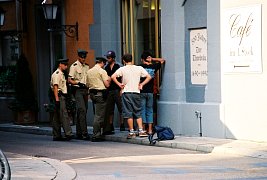 Just as well will witness in Paris, the police in Germany are quick to
descend on anyone who seems suspicious. These guys are having to
empty their backpacks for inspection. We were never bothered, but you can
tell the general level of security has increased in Europe.
Just as well will witness in Paris, the police in Germany are quick to
descend on anyone who seems suspicious. These guys are having to
empty their backpacks for inspection. We were never bothered, but you can
tell the general level of security has increased in Europe.
|
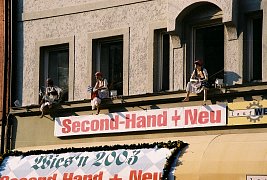 No, these are not young women hanging out the windows, but mannequins. I initially
decided against making this picture, but it's so bizarre that I had to give
in.
No, these are not young women hanging out the windows, but mannequins. I initially
decided against making this picture, but it's so bizarre that I had to give
in.
|
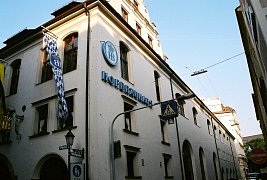 The Hofbräuhaus
beer hall has existed since 1644 and lives up to its reputation: beer, food,
tourists, oom-pah music, drunken revelry and Lederhosen. Check out the wall of beer steins,
personalized and locked away for their owners. Tables labeled with "Stammtisch" are
reserved for regulars (this is true for all Bavarian restaurants). I had a giant beer
here at the Hofbräuhaus - I didn't care for it. I did like Augsburger beer, however.
At night Frieda and Berhard and their daughter took us to an outdoor beer garden in a
giant park. Maybe this is where Octoberfest is held. I remember at 10:00 p.m. on a hot, sticky
August midweek night thousands of people were still sitting out in the park drinking beer, eating
both trout and chicken on a stick.
The Hofbräuhaus
beer hall has existed since 1644 and lives up to its reputation: beer, food,
tourists, oom-pah music, drunken revelry and Lederhosen. Check out the wall of beer steins,
personalized and locked away for their owners. Tables labeled with "Stammtisch" are
reserved for regulars (this is true for all Bavarian restaurants). I had a giant beer
here at the Hofbräuhaus - I didn't care for it. I did like Augsburger beer, however.
At night Frieda and Berhard and their daughter took us to an outdoor beer garden in a
giant park. Maybe this is where Octoberfest is held. I remember at 10:00 p.m. on a hot, sticky
August midweek night thousands of people were still sitting out in the park drinking beer, eating
both trout and chicken on a stick.
|
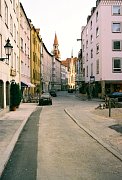
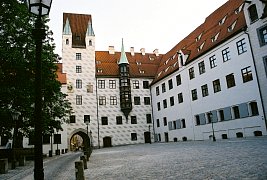
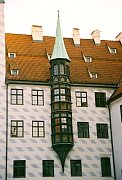
|
|
We again reached the Marienplatz and walked up to the
Altes Rathaus corner, we turn into the Burgstrasse, a charming old
Munich street. The picture (far right above) looking back shows the Altes Rathaus.
The Burgstrasse terminates in the courtyard of Alter Hof, the old castle of the ruling
Wittelsbacher Dukes (1255).
The south façade with it's
severe, almost modern-looking gate-tower and oriel is particularly well-preserved.
People sometimes call it ‘Affenturm’ (Monkey Tower), because legend has it that a
trained monkey once abducted the small son of Duke Ludwig the Severe - the later
Head of the Holy Roman Empire Ludwig IV ‘The Bavarian’ - and carried him to the top
of the oriel. In actual fact, however, the oriel wasn't built till long after the
Emperor’s death. The
buildings have been reconstructed several times over the centuries, most notably
in the nineteenth century and after the Second World War.
|
 After taking in the Monkey Tower we again walked back to the Marienplatz to
the Viktualienmarkt - the open market. We purchase some flowers for our
hosts and then as the sun went down we boarded a train for the
short train ride back to Pasing.
After taking in the Monkey Tower we again walked back to the Marienplatz to
the Viktualienmarkt - the open market. We purchase some flowers for our
hosts and then as the sun went down we boarded a train for the
short train ride back to Pasing.
|


















